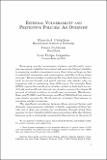Artículo
External vulnerability and preventive policies: an overview
Fecha
2006Resumen
Emerging market economies endure significantly more macroeconomic volatility than industrial countries. Output volatility in emerging market economies is more than twice as large as that in industrial economies, and consumption volatility is three times as large. Recent studies corroborate the view that external factors, such as terms-of-trade and world interest rate shocks, play an important role in explaining these differences. For example, Kose (2002) reports that world price shocks—which include both termsof-trade and world real interest rate shocks—account for almost 90 percent of output variation in small open economies. Blankenau, Kose, and Yi (2001) and Neumeyer and Perri (2004) find that interest rate shocks account for 30–55 percent of output fluctuations in emerging market economies.
Colecciones
Descargar


